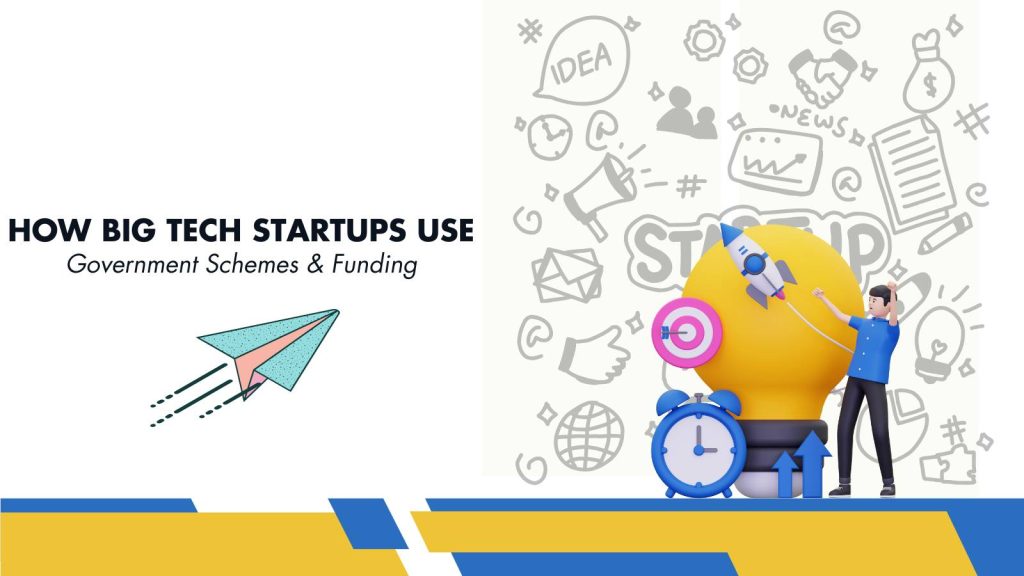Funding remains one of the most critical factors in determining the growth and sustainability of startups. While venture capital (VC) and private equity often dominate headlines, government funding schemes play a strategic and increasingly influential role in supporting startups, particularly those in high-growth technology sectors.
These programs not only provide financial resources but also credibility, mentorship, and access to innovation ecosystems. Big tech startups—spanning AI, SaaS, deep tech, healthcare technology, and fintech—leverage these schemes to scale efficiently, reduce financial risks, and strategically position themselves in the market.
Find structured analysis of how startups use government funding, major schemes available, practical strategies for utilization, and insights into future trends.
Understanding the Landscape: Big Tech Startups + Government Support
Big tech startups are characterized by their focus on cutting-edge technologies and high scalability potential. They often require substantial investment for research, product development, and market penetration. While VC funding provides capital, it often comes with equity dilution and performance expectations. Government schemes, on the other hand, offer funding with minimal or no equity demands, enabling startups to focus on innovation rather than investor pressures.
Financial support, government schemes offer startups strategic advantages, such as access to incubation programs, mentorship, regulatory guidance, and networking opportunities with industry leaders. This is particularly critical for early-stage startups navigating regulatory frameworks or attempting to penetrate competitive markets. By leveraging these programs, startups can also improve credibility, signaling to private investors that the business is validated and supported by recognized government initiatives.
Government schemes also facilitate ecosystem development by promoting collaboration between research institutions, private investors, and startups. This creates an environment that fosters innovation, reduces risk, and accelerates commercialization.
Major Government Schemes Tech Startups Should Know
Several government schemes in India provide targeted support for startups across different stages of development. Understanding these schemes is essential for strategic utilization.
Startup India Seed Fund Scheme (SISFS)
- Focus: Supports proof-of-concept development, prototype creation, and early-stage operational expenses.
- Benefits: Grants of up to INR 50 lakh are available to cover costs such as product development, market research, patent filing, and initial operations.
- Eligibility: Must be a recognized startup under Startup India, operate in India, and demonstrate innovative potential.
- Additional Insights: SISFS enables startups to experiment with innovative solutions without immediate revenue pressures, significantly reducing early-stage risk. It also supports participation in exhibitions, networking events, and technology validation processes.
Fund of Funds for Startups (FFS)
- Focus: Supports scale-up stage startups through government contributions to Alternative Investment Funds (AIFs), which co-invest with private capital.
- Benefits: Provides access to large-scale funding required for rapid expansion, market entry, or product scaling.
- Eligibility: High-growth potential startups with innovative products or solutions in sectors prioritized by the government.
- Additional Insights: FFS reduces the risk exposure of private investors and encourages co-investment in startups, facilitating access to larger pools of capital. This hybrid financing model also helps startups attract venture capital with added credibility.
Credit Guarantee Scheme for Startups (CGSS)
- Focus: Collateral-free loans for startups from recognized financial institutions.
- Benefits: Provides working capital or operational financing without requiring assets or personal collateral.
- Eligibility: Registered and recognized startups with scalable business plans.
- Additional Insights: CGSS supports operational liquidity, workforce expansion, technology adoption, and market growth, enabling startups to scale without compromising equity. Collateral-free loans are particularly beneficial for early-stage tech startups lacking tangible assets.
Atal Innovation Mission (AIM)
- Focus: Encourages innovation, research-driven entrepreneurship, and incubation of startups.
- Benefits: Offers grants, mentorship, networking opportunities, and access to innovation hubs across India.
- Eligibility: Innovative startups with scalable and replicable business models.
- Additional Insights: AIM facilitates collaboration between startups and research institutions, fostering development of deep-tech solutions. Incubation support from AIM includes access to laboratories, R&D resources, and expert guidance, helping startups overcome technical challenges and accelerate commercialization.
Pradhan Mantri Mudra Yojana (PMMY)
- Focus: Provides micro-financing to small businesses and startups, especially in semi-urban and rural areas.
- Benefits: Loans ranging from INR 50,000 to INR 10 lakh for operational expenses, technology adoption, and expansion.
- Eligibility: Micro and small enterprises, including startups, looking to scale operations or maintain liquidity.
- Additional Insights: PMMY helps startups overcome the traditional barriers posed by banks, such as lack of collateral or credit history. This enables regional entrepreneurship and supports startups outside major metropolitan centers.
How Big Tech Startups Use These Schemes: Insider Breakdown
Government funding is a strategic tool for startups and is deployed differently at each stage of growth:
Ideation & Prototype Stage: Startups utilize schemes like SISFS or AIM to fund R&D, develop prototypes, and validate innovative ideas. Early-stage grants reduce financial pressure and allow for experimentation without immediate revenue constraints.
Market Entry Stage: After successful validation, startups use FFS or AIM programs to scale operations, test product-market fit, and expand geographically. Mentorship and incubation support during this stage help startups navigate market challenges, regulatory compliance, and operational scaling.
Growth & Scale-up Stage: CGSS loans or PMMY micro-financing provide liquidity for workforce expansion, infrastructure development, and market entry. Government-backed funding complements private investment, ensuring startups maintain equity while accessing required resources.
Government funding also assists in patent filing, technology certification, and participation in government procurement opportunities. Startups that strategically combine multiple schemes with private investments can optimize capital utilization, accelerate market entry, and achieve sustainable growth.
Key Advantages for Tech Startups Leveraging Schemes
- Reduced Financial Risk: Startups can experiment with innovative solutions using grants or collateral-free loans, reducing founder risk and improving business resilience.
- Access to Mentorship and Networks: Incubation centers and government-supported mentorship programs provide guidance in operations, regulatory compliance, technology commercialization, and market expansion.
- Improved Investor Confidence: Government backing validates the startup’s potential, making it easier to attract venture capital or strategic investors.
- Tax Incentives and Subsidies: Many schemes offer tax exemptions, regulatory fee reimbursements, and other incentives that enhance cash flow and profitability.
- Operational and Strategic Flexibility: Funding can be allocated to R&D, infrastructure, workforce expansion, or market penetration, providing startups with a competitive edge.
- Enhanced Credibility and Market Positioning: Recognition from government programs signals reliability and innovation, helping startups establish partnerships, attract customers, and participate in industry collaborations.
Common Challenges & How to Navigate Them
Startups face several challenges when leveraging government schemes:
- Eligibility Criteria: Each scheme has specific requirements related to startup registration, turnover, innovation type, and operational history. Startups must assess their eligibility carefully.
- Processing Delays: Approval and disbursement timelines can be longer than private funding, requiring careful financial planning.
- Restricted Use of Funds: Funds may be earmarked for specific purposes like R&D or prototype development, limiting flexibility.
- Compliance Requirements: Startups must maintain meticulous records, submit regular reports, and comply with all regulatory requirements to prevent penalties or fund revocation.
- Balancing Public and Private Funding: Over-reliance on government funding without integrating private investment can limit operational agility. A hybrid funding strategy is essential.
Strategic Playbook: Maximizing Government Funding
- Register and Recognize: Ensure startup recognition under Startup India to access multiple schemes.
- Map Schemes to Startup Lifecycle: Identify which programs align with ideation, prototyping, scaling, or operational needs.
- Plan and Time Applications: Align funding requests with product development and market milestones to ensure timely capital availability.
- Leverage Mentorship and Networks: Utilize incubators, accelerators, and government support to strengthen application quality and operational execution.
- Integrate with Private Capital: Combine government funding with venture capital or angel investment to achieve financial flexibility and scalability.
- Ensure Compliance: Maintain accurate documentation, adhere to reporting requirements, and use funds strategically to prevent delays or penalties.
Hybrid funding models, combining government and private capital, are likely to become the standard practice for startups aiming for long-term growth, operational flexibility, and sustainable innovation.
FAQs
Q1: What are the main government schemes available for tech startups?
Key schemes include Startup India Seed Fund Scheme (SISFS) for early-stage funding, Fund of Funds for Startups (FFS) for scale-up capital, Credit Guarantee Scheme for Startups (CGSS) for collateral-free loans, Atal Innovation Mission (AIM) for incubation and mentorship, and Pradhan Mantri Mudra Yojana (PMMY) for micro-financing.
Q2: Can early-stage tech startups access government funding?
Yes. Programs like SISFS and AIM are specifically designed to support early-stage startups by funding prototypes, proof-of-concepts, research, and product development without immediate revenue pressure.
Q3: Are government funding schemes equity-free?
Most grants, such as those under SISFS, are equity-free. Debt-based schemes like CGSS or PMMY require repayment but do not involve giving up ownership, making them ideal for founders who want to maintain control.
Q4: How do big tech startups strategically use government schemes?
Startups use grants for prototyping and research, leverage FFS-backed funds for scaling operations, and secure collateral-free loans through CGSS or PMMY for operational liquidity. This phased approach maximizes capital efficiency and growth potential.
Q5: Can startups combine multiple government schemes?
Yes. Many startups strategically combine grants, scale-up funding, and collateral-free loans to cover different business needs. For example, SISFS for prototyping, FFS for expansion, and CGSS for working capital.
Q6: What are the eligibility criteria for tech startups to access these schemes?
Eligibility typically requires startup recognition under programs like Startup India, innovative or technology-driven solutions, a scalable business model, and compliance with scheme-specific revenue or operational limits.
Q7: How long does it take to receive funding from government schemes?
Processing times vary. Grants may take 3–6 months, while collateral-free loans can be disbursed faster if documentation is complete. Planning fund requirements in advance is critical for smooth operations.
Q8: Do government schemes support startups beyond major cities?
Yes. Most schemes are accessible to startups across all cities and towns, including Tier-2 and Tier-3 locations. This encourages regional entrepreneurship and innovation beyond metropolitan areas.
Q9: What sectors benefit most from government funding schemes?
Priority sectors include AI, deep tech, SaaS, healthcare technology, fintech, and climate tech, although most programs support any innovative startup with scalable and technology-driven solutions.
Q10: What are the key benefits of using government funding for startups?
Benefits include reduced financial risk, equity retention, access to mentorship and incubators, credibility for private investors, tax incentives, and strategic growth opportunities. Government schemes help startups scale sustainably while maintaining operational and financial flexibility.




